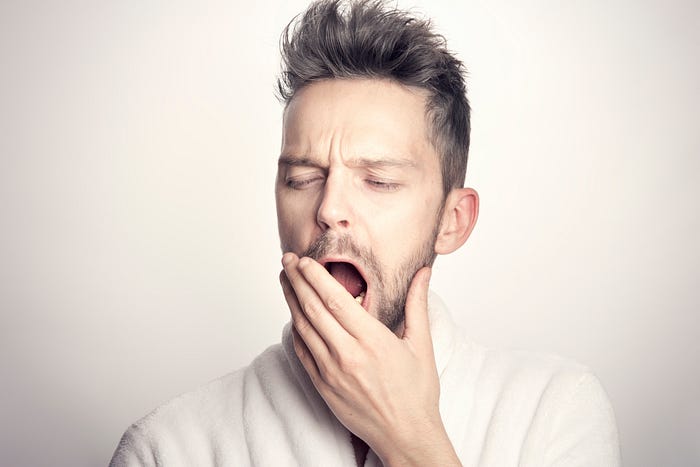We all know the feeling. It’s 7AM, your alarm bell rings.
But f* that. You know you need to get up, but you wanna sleep for just 5 more minutes, am I right?
I’ve done. I think we’ve all done it now and then.
I never thought anything of it, just “that I should go to bed earlier”.
But recently, I read something about — a scientific article that claimed it’s actually really NOT GOOD, health-wise.
I found it so interesting that I decided to write a short summary about it.
Why is it harmful?
When you frequently hit the snooze button, you’re interrupting your sleep cycle at critical points, which can mimic the effects of reduced sleep duration by lowering the quality of sleep, even if the total sleep time remains unchanged.
So by hitting the snooze button, you could simply say that it’s as if you’re SLEEPING LESS, because the interrupted, fragmented sleep you get after snoozing isn’t as restorative or effective as continuous sleep.
So even though you’re spending more time in bed, the quality of your sleep suffers, leading to feelings of tiredness, grogginess, fatigue and reduced alertness, similar to the effects of actually sleeping less.
Negative Impact Overview
Now that we know WHY it’s harmful, let’s now quickly go over what the impact might be.
1. You’ll be more tired during the day
When you go to sleep again after hitting that snooze button, you’re actually telling your brain “to start the sleep cycle all over again”. So, you’re basically falling asleep again, but if you then wake up again a few minutes later, you might feel groggy, blurry, tired.
You’ll feel it will be even more difficult to wake up full and start your day.
2. It can lead to a weaker immune system
Heh? What? How?
Well, it’s a bit logical isn’t it?
The connection between sleep and immune function is well-documented and there have been countless of studies around it.
Sleep is CRUCIAL for the regulation of your immune system.
During sleep, the body releases cytokines, a type of protein that targets infection and inflammation, which takes care of the immune response.
If your sleep is disrupted, then the production of these protective cytokines are also disrupted, together with antibodies and cells that fight infection & illnesses. Makes sense?
3. Vaccines become less effective
This one is crazy.
We all remember our COVID vaccines, yes? So apparently, if your sleep gets disrupted due for example snoozing, it can affect the body’s ability to respond to vaccines.
A study in the Sleep journal, found that people who slept fewer hours per night had a reduced antibody response to vaccines, which indicates a direct connection between sleep and immune efficiency.
And as I’ve written above: Hitting the snooze button and compromising sleep quality can potentially affect the body’s immune efficiency in a manner similar to that observed in individuals getting fewer hours of sleep overall.
4. It can lead to a heart diseases
A study from the Journal of the American College of Cardiology shows how disrupted sleep patterns, including those caused by hitting the snooze button, can increase the risk of heart disease.
Additionally, poor sleep can cause other issues such as elevated blood pressure and higher levels of inflammatory markers. It’s just not good.
While these study focuses on cardiovascular risks, there are various studies that prove the link between poor sleep and a weakened immune system.
5. Stress Increase!
Seriously, how ANNOYING is that god d*mn alarm?!
I haven’t even gotten out of bed yet and I’m already annoyed & stressed because of it. Aaaarghhhhh!
So, be aware that the repeated alarm can increase stress levels right from the start of your day. Waking up repeatedly in a short span can make mornings feel more stressful.
6. Your body gets CONFUSED
I mean… what’s it gonna be now? Wake up, or sleep?
That’s exactly what your body thinks. “Should I wake up or should I sleep? Make a choice!”
You’re confusing your body’s internal clock, making it harder to wake up in the morning and fall asleep at night.
7. Sleep Inertia
What is sleep inertia?
I’m sure we’ve all experienced it at some point. It’s that feeling of grogginess, drowsiness, disorientation & reduced alertness after waking up.
You don’t have focus. Your brain is blurry.
According to a study published in the Journal of Sleep Research, fragmented sleep caused by snoozing can intensify sleep inertia, impairing cognitive function and mood for up to an hour after finally getting up.
8. Reduced brain function & memory
As you might expect, having a good night of sleep is crucial for memory consolidation and learning.
A research article in Nature Reviews Neuroscience highlights that disturbed sleep, such as that caused by frequent snoozing, can negatively impact these cognitive processes, potentially leading to long-term memory issues.
9. Weight Gain
There’s a link between poor sleep habits, including hitting the snooze button, and weight gain.
The American Journal of Epidemiology published a study showing that people with irregular sleep patterns, including fragmented sleep, have a higher risk of obesity. This is partially due to hormonal imbalances affecting appetite regulation.
So, when you snooze, you’re essentially delaying the start of your day, which can throw off your eating schedule and lead to unhealthy snacking and overeating.
HOW TO AVOID SNOOZING
To avoid the negative effects of hitting the snooze button (and avoid hitting that button altogether), it’s important to establish a regular sleep routine and stick to it as much as possible.
Some tips for doing so include:
- Going to bed and waking up at the same time every day, even on weekends
- Avoiding caffeine and other stimulants before bed
- Creating a relaxing bedtime routine to help you fall asleep more easily
- Exercising regularly to help regulate your sleep cycle
- Using a light alarm clock that gradually wakes you up with light instead of sound
Conclusion
Avoid that darn button.
Try to follow the tips above and avoid hitting the snooze button. This can help protect your health and ensure that you wake up feeling refreshed and energized every day.









